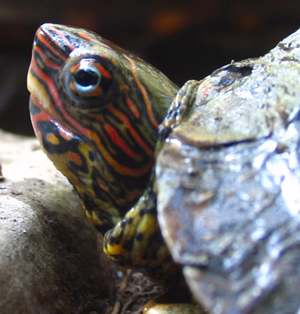 |
 Wild Animal Protection
Wild Animal Protection
By Geoff McCabe Tropisphere - Costa Rica Real Estate First Published in Que Pasa Magazine I've been very happy to see how many people who are investing in the Malpaís - Montezuma area are interested in protecting and improving their land for the animal species that live here. Mary's article this month in Que Pasa has some great advice about tree planting, and as a land owner there's more that you can do to help. Animals need habitat, and the good news is that despite the development in the area, habitat has been growing as many cattle ranchers are letting all or parts of their fincas grow back into jungle. Most of the jungle in the area is second growth, although you can find a few scattered large trees, especially if they happened to grow within ten meters of a river, where it was forbidden to cut them. To help animals, plant trees that fruit all year such as ylang-ylang, and species that don't lose their leaves in the dry season. Try to close gaps between forested areas, to help arboreal animals travel without coming to the ground. Planting trees generally improves the value of your land too. One of the biggest threats to monkeys and other tree-dwelling animals is live wires and leads on the transformers. Most developers don't put shielding on the top line, and if a tree branch grows too near it, an animal that touches it from the tree will be electrocuted. Many monkeys and kinkajous are dying every year from this. To help prevent this, you can hire a company to install a new type of shielded line for the top electric line, which costs $3.25 per meter, plus installation and transport. Contact Ramiro at 838-2679 for more information. Animals are also being electrocuted by the leads on transformers. It's possible to buy foam covers for the transformer leads, and I've been told that it will cost $150-$200 per transformer to do this, but I don't have a source yet. Simply keeping branches cut away from the power lines reduces much of the problem. Probably the biggest threat to animal life in the area - especially ground mammals such as pizotes, anteaters, pacas, and agoutis, is large dogs. Rotweillers and pit bulls are popular in the area as protection against thieves, but are also devastating on ground mammals that are an important part of the population. Please consider that "man's best friend" is not the best friend of the jungle. They are aggressive, non-native species that are going to wipe out many species as the human population grows in the area. Consider other options such as decorative iron bars on your windows (there are several good artists in the area who do great work), hire a full time caretaker/guard, or encourage a reputation for yourself as a trigger-happy gun nut who can't wait to test out your new Smith and Wesson on a burglar! Most people don't know that building bonfires out of driftwood is not only illegal, but very destructive to the beaches. The wood tossed up on the beach is a habitat for many creatures, and also protects mangroves and beach trees from having the sand eroded from around their roots. If you want to build a fire, bring your own wood. Some people think its cute to feed wild animals by hand. Bird feeders are one thing, but training pizotes and kinkajous to eat out of your hands is dangerous for you, your pets, and especially the animals themselves. Their best defense is their fear of humans, and once they lose this fear, they're easy prey for hunters. If you want to feed them, plant their favorite foods and watch them eat in their native habitat. |

| Copyright 2013 by Rainsong Wildlife Sanctuary All Rights Reserved |